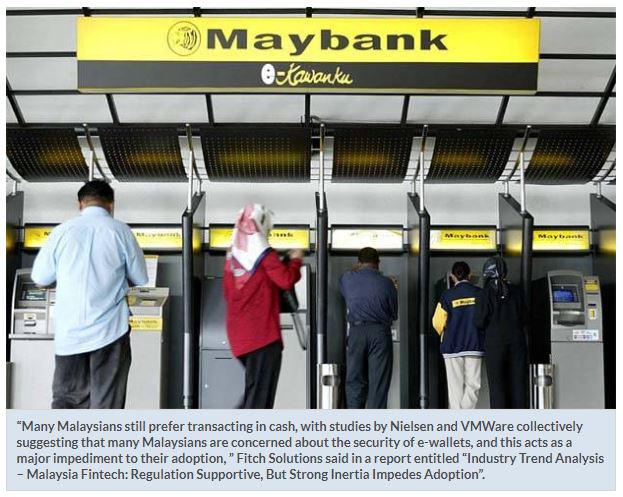Fitch Solutions: Malaysians still prefer cash to cashless transactions
PETALING JAYA: Malaysia has missed its 2020 cashless target, as many still prefer cash transactions despite the boom in e-wallet platforms, according to Fitch Solutions Macro Research.
Notably, Bank Negara has set some targets to migrate cash transactions to electronic payment systems under its Financial Sector Blueprint 2011-2020.
The targets include increasing the number of e-payment transactions per capita from 44 transactions to 200 transactions, and reducing cheques by more than half from 207 million to 100 million per year.
In 2018, data by Fitch Solutions showed that e-payment transactions per capita stood at 124.6 transactions from 49.1 transactions in 2011.
Meanwhile, more than 101 million cheques cleared in 2018, down from 204.9 million in 2011.
“We view that Bank Negara is unlikely to meet its target of migrating cash transactions towards electronic payment systems.
“Many Malaysians still prefer transacting in cash, with studies by Nielsen and VMWare collectively suggesting that many Malaysians are concerned about the security of e-wallets, and this acts as a major impediment to their adoption, ” Fitch Solutions said in a report entitled “Industry Trend Analysis – Malaysia Fintech: Regulation Supportive, But Strong Inertia Impedes Adoption”.
Nevertheless, it pointed out that the central bank has announced that it is working on a new financial sector blueprint, and will continue to double down on incentives and support for fintech players to intensify the cashless society effort, together with other government entities.
In terms of players in the digital payment sector, Fitch Solutions said that many of the applications continue to be bank-led, including Malayan Banking Bhd and CIMB Bank, which have introduced their QR code-based, point-of-sale payment services that allow fund transfers directly from a buyer’s account to the seller’s business account.In addition, Bank Negara has scrapped the 50-sen inter-bank transfer fee beginning July 2018, and introduced new digital platforms to facilitate fund transfers, namely, DuitNow, which enables a recipient to receive funds using their mobile or national identification numbers.
Other notable digital payment platforms include Touch n’ Go, GrabPay, and Boost.
Ant Financial’s AliPay and Tencent’s WeChat Pay are also accepted in major tourist hotspots in the country, although they largely cater to inbound Chinese tourists, Fitch Solutions added.
The research house expects the impending digital banks to be introduced at the end of this year.
Towards this end, Bank Negara has announced that there are 10 parties who have expressed interest in applying for a digital banking licence.
“Little else has emerged on Bank Negara’s plans, although the potential of new disruptors emerging would definitely force incumbent banks to double down on their digitisation initiatives in other to prevent a significant ceding of market share to the newcomers.
“Ride-hailing app Grab has been widely purported to be among the potential applicants for a digital banking licence, ” Fitch Solutions said.
Source: https://www.thestar.com.my/business/business-news/2019/07/31/fitch-solutions-malaysians-still-prefer-cash-to-cashless-transactions#1m4DB2DLjHwRO42y.99


 English
English




